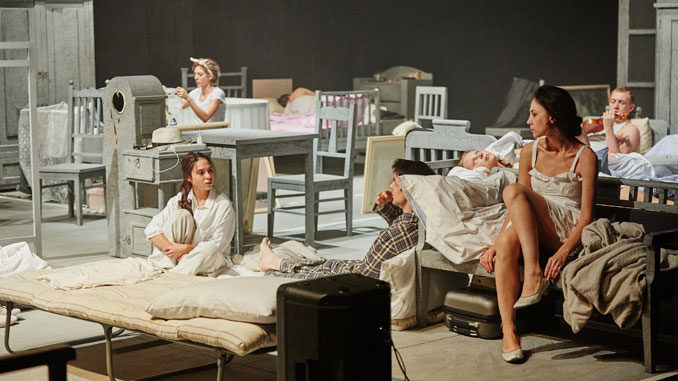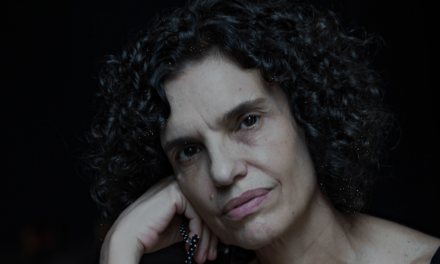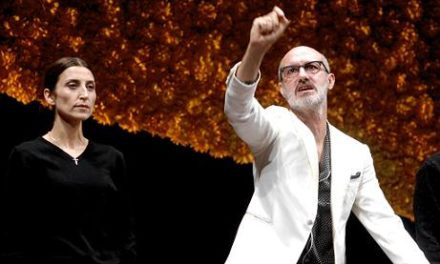Timofey Kulyabin is one of the most prominent young directors in Russia today. At 34, he has already staged nearly two dozen productions across the Russian Federation as well as internationally in France, Austria, Romania, Germany, and Switzerland. In 2016, he was commissioned by Moscow’s Bolshoi Theatre to stage Donizetti’s opera Don Pasquale and in 2019 he will offer up a new staging there of Dvořák’s opera Rusalka.
In early 2018, his staging of a sign-language production of The Three Sisters for the Red Torch Theatre in Novosibirsk, of which he is Artistic Director, was presented in cinemas across the US and UK as part of the Stage Russia HD project. In an exclusive interview with me, Timofey tells about the universality of Chekhov’s heroes, how filmed performances can actually enhance a theatrical performance, and provides insight into how the Ministry of Culture of Russia prevents culture from developing in his country.
ELKIN: Your sign language production of Three Sisters all started with Chekhov, Timofey?
KULYABIN: It all started, actually, with the idea to make a performance in sign language. The language is naturally expressive and theatrical. At first, I thought about connecting it to a new piece, but then I got the idea that the text should be very famous, something that’s been staged thousands of times…and then I thought about Three Sisters.
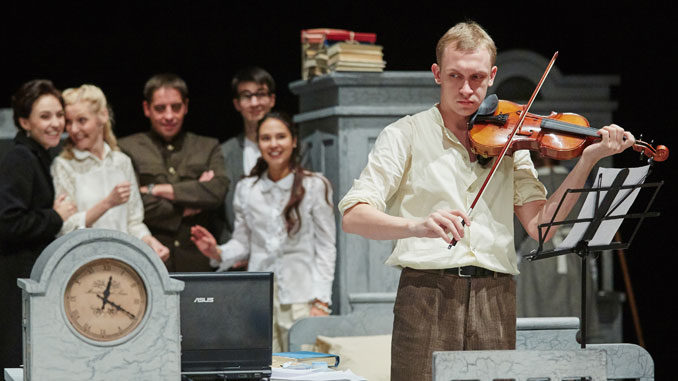
A scene from the play Three Sisters. Photo – Victor Dmitriev
ELKIN: Your performance does not convey a feeling of silence. It seems to me that with the change of language from words into sign language, the drama, and energy of what is happening has only increased.
KULYABIN: On the one hand, the words presented as they are in subtitles are visualized, which has its own kind of energy. On the other hand, total silence in the performance is only in two episodes. The rest of the time the characters live, and their life sounds accompany the action. One of the basic elements of the performance is a continuous sound score. A knock, a cough, something falling, someone pushing back a chair–it’s all been carefully rehearsed, of course. All sounds were spelled out. In this sense, the performance is extremely musical.
ELKIN: Did you want to achieve this effect, or was it born during the rehearsal process?
KULYABIN: Since I‘d never done such a performance, it was impossible to cling to something familiar. Everything was new for everyone, everything was born at rehearsals. But sound organizes tempo, rhythm and, in this sense, perception. I realized that sounds should be structured in some form, a composition that works on an emotional state.
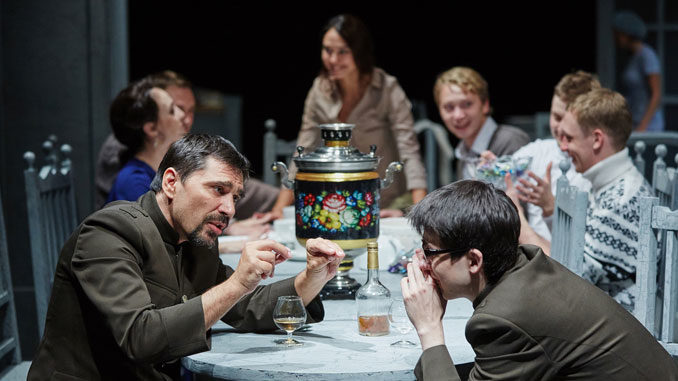
A scene from the play Three Sisters. Photo – Victor Dmitriev
ELKIN: I liked one review of the work: “We have never heard such Chekhov.” But you have deprived the actors of the main instrument–the voices deprived them of the possibility to pronounce Chekhov’s text. Did they have bitterness? To play Masha and not say a word, to play Vershinin and not utter the famous farewell monologue…
KULYABIN: On the contrary, it takes twice the effort. You can deceive with your voice, you can just intonate correctly, but here it will not work. Either something happens to you, or it does not. No accurate intonation will save you. The actors understood what a storehouse this was and appreciated the gift. Going out for the hundredth, thousandth, ten thousandth time and saying “To Moscow, to Moscow, to Moscow…” is not the greatest pleasure. The viewer no longer hears Chekhov, and this is a big problem. The text is overwritten. Our performance is in some sense a rescue operation. Chekhov can be played, but it is not necessary to pronounce it out loud.
ELKIN: Did the actors immediately enter the game, or was it difficult for them to switch from one language to another?
KULYABIN: First, the actors spent a year and a half with teachers being taught this new language. Then, piece by piece, we went through the text. Only then did they take the stage and try to pronounce the text, walk, pick up objects, sit down, stand up. Then we layered in the domestic actions. I had to re-master it. And finally, we began the rehearsals of the scenes. Now they are doing it wonderfully, but everything happened very systematically.
ELKIN: The leitmotif of your recent interviews is the idea that you are creating performances–be it Don Pasquale, Rigoletto, Macbeth or Onegin--about today. You say, “I don’t know about another time.” What is relevant about, for example, Chekhov’s heroes?
KULYABIN: Chekhov wrote unique types. As a doctor, he was a great psychologist and a pathologist who dissected a person, his soul, emotions. He liked to study a person in crisis, in pain, a person suffering. Chekhov’s heroes are universal, they are not limited to a specific era. I have no distance towards them. Chekhov remains a very living and breathing author.
ELKIN: Let’s talk about the film version of the performance. The viewer sees on stage six rooms. There are no walls between them. The action takes place simultaneously in different rooms. If you show a close-up of one, the viewer loses touch with what is happening in the other rooms. How did you solve this problem?
KULYABIN: Yes, this multi-sensory experience is lost in the film version. But on the other hand, sitting in the theater, you really cannot take in everything at once anyhow. In the film, I was able to help focus the watcher’s attention in a way that actually enhances the experience. It was not easy to do. We recorded the play a week before the official premiere in front of an invited audience, and it took, with breaks, over 10 hours to complete. It was necessary to break because in the third act the lights go out several times, and the actors are illuminated by their mobile phone screens. For the camera, this is quite problematic. Therefore, it was necessary to stop and reconfigure the optics.
ELKIN: Did you make any changes for the cinema premiere?
KULYABIN: None. You will see the full 4-hour version.
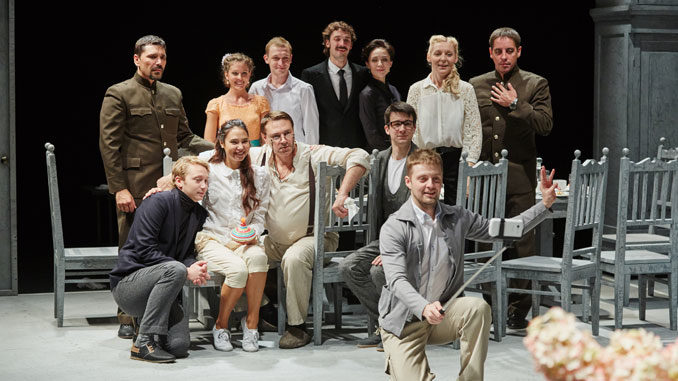
A scene from the play Three Sisters. Photo – Victor Dmitriev
ELKIN: How did you react to the idea of Eddie Aronoff to show this version in the framework of the program of Stage Russia?
KULYABIN: This is a great idea. “Gamma” TV has shot six of our performances. All–at a very high level, with a large number of cameras. We have long wanted to show this performance. In Soviet times, there were a lot of television performances, and in the post-Soviet period almost no one was involved in this genre, and it’s almost disappeared. We, of course, were pleased with Eddie’s proposal and immediately agreed to it.
ELKIN: Do people react to the performance differently in different countries? For example, in Novosibirsk and Vienna …
KULYABIN: The audiences, of course, are different everywhere: in Vienna, Novosibirsk, Paris … But there’s no significant difference. The peculiarity of the performance is that the viewer is forced to work on it, so to speak. For the first thirty or forty minutes, everyone is just trying to understand how it works: you need to read, follow, understand who is talking and in which room… At first, it’s even a bit annoying, it’s unusual for theater-goers. But if they want to understand what is happening, they are forced to “enter” the rules of the game. Then it all clicks. The fourth act of the performance is viewed by the audience in a completely different way; they become a community that has a shared secret that others do not have.
ELKIN: You once said that art doesn’t exist to be liked. And what does it exist for?
KULYABIN: Art discovers pain points. It has a socially important function. Art makes you look at familiar, well-established things from a different angle and cast doubt on what seems obvious. Art is in dialogue with reality, and this dialogue can be annoying and not necessarily lyrical and humanistic. Art teaches three-dimensional thinking; it teaches us to look at things, events, at a person, it complicates the picture of the world–in a good sense. It makes it wider, fuller. Art does not persuade, it is not instructive. It provokes you to discover a new meaning. All this is very important, but has nothing to do with “like-dislike.” Someone likes one thing, another likes another thing–it’s a matter of taste. It is impossible to please everyone at once–neither in art, nor in life, nor in the kitchen.
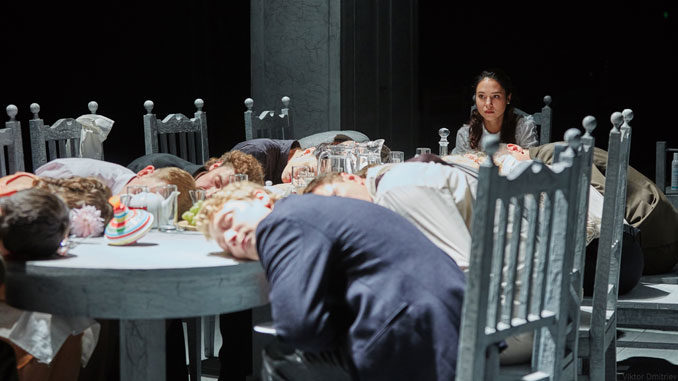
A scene from the play Three Sisters. Photo – Victor Dmitriev
ELKIN: What are your thoughts on the “Serebrennikov case,” the scandal around the films Matilda and The Death of Stalin, and other discouraging things that are happening today in Russia?
KULYABIN: This is not about art, but about something else; about political games where an artist is assigned the role of a pawn, and art is just loose change. The current Ministry of Culture in Russia is hindering the development of culture. The priority for support is an artificially constructed ideological line that is not able to produce anything but dead, pseudo-opportunistic content that is not really needed by anyone. It’s quite a strange paradigm, and we are living in it.
ELKIN: Timofey, imagine that you are at the premiere of the film The Three Sisters in Chicago, New York, or San Francisco. You have one minute to address the audience in the hall. What would you say to them?
KULYABIN: In short, I would probably say that you should have patience. What you see on the screen is authentic sign language, but this is not a play about the hearing impaired. It has no social function. This is a kind of theatrical device, a method that allows us to clear away the layers of Chekhov performances, which, over the last hundred plus years, have stuck to the initial work and, unfortunately, overwhelmed our perception of it so much that we can no longer see pure Chekhov. In this film, you watch the performance and read Chekhov’s text. You speak with your own voice and read with your own eyes. I hope the play makes you think!
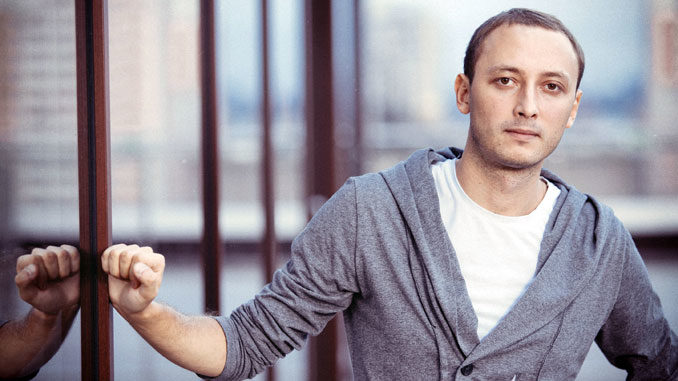
Timofey Kulyabin. Photos from the personal archive of T.Kuliabina
Timofey Kulyabin’s The Three Sisters is continuing its cinematic run in venues across China and will soon be available for online streaming via Broadway HD. His Onegin, an award-winning modern reimagining of Alexander Pushkin’s classic novel in verse, will be hitting cinemas across the US and UK this November. For more information on the production and a list of participating cities visit www.stagerussia.com/onegin.
This is the English language edited reprint of the same article from Reklama Magazine. The original article in Russian can be found here.
This post was written by the author in their personal capacity.The opinions expressed in this article are the author’s own and do not reflect the view of The Theatre Times, their staff or collaborators.
This post was written by Sergey Elkin.
The views expressed here belong to the author and do not necessarily reflect our views and opinions.

